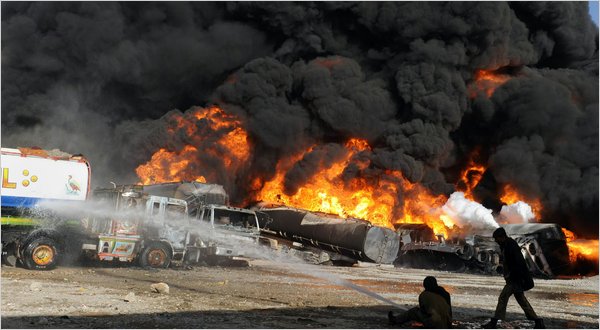
“You have the watches, but we have the time,” the Taliban like to say.
But now the Washington Post reports that the Taliban’s top commanders are “very serious” about finding a way to end the war. Their eagerness is driven by fear that their power will be usurped.
The leadership knows “that they are going to be sidelined,” the source said. “They know that more radical elements are being promoted within their rank and file outside their control. . . . All these things are making them absolutely sure that, regardless of [their success in] the war, they are not in a winning position.”
In this narrative, when it comes the issue of negotiating peace, it’s Washington that has been dragging its feet, waiting for an advantageous position.
The United States’ European partners in Afghanistan, with different histories and under far stronger domestic pressure to withdraw their troops, have always been more amenable to a negotiated settlement. “What it really boils down to is the Americans both supporting and in some cases maybe even participating in talking with the enemy,” the first European official said. “If you strip everything away, that’s the deal here. For so long, politically, it’s been a deal breaker in the United States, and with some people it still is.”
Whatever domestic political difficulties the administration may fear would result from a negotiated deal with the Taliban, this official said, would be resolved by ending the war earlier rather than later. “A successful policy solves the political problem,” he said.
U.S. officials depicted a somewhat different progression leading to the same conclusion, insisting that the time for real negotiations has only now arrived. Although last fall’s strategy review concluded that defeat of the Taliban was an unrealistic goal, it was followed this year by “a period of time where we’ve been focused on getting our inputs in place, moving resources into Afghanistan,” a senior administration official said. The Afghan government has also been positioning itself for serious talks, he said, through international conferences in January and July, the convening of a “peace jirga,” or council, in Kabul and last week’s naming of the members of an official government reconciliation team.
“Now, yeah, there’s a sense that we mean what we say” when voicing support for a political process, the official said. “The president’s view is that we have to do these things at the same time. We can’t take the approach that we’re just going to be putting our foot on the gas on the military side of things and will get around to the political,” he said.
Last month, Obama pressed his national security team to be more specific about what it meant by a political solution, and “reinforced” the need to be working simultaneously on the military and political sides of the equation, the official said.
Gen. David H. Petraeus, the top U.S. and NATO commander in Afghanistan, told reporters last week that high-level Taliban leaders had “sought to reach out” to the top level of the Karzai government. “This is how you end these kinds of insurgencies,” he said.
So, even as NATO convoys are getting blown up in Pakistan, things are moving into alignment in Afghanistan just in time for a favorable policy review in December and the beginning of troop withdrawals in July. What a stroke of luck!
What makes me skeptical that Mullah Omar is ready for retirement in Saudi Arabia?


Do the people who spout this garbage really believe it, because nobody else does?
Does it matter?
When the US upsets an applecart and then eventually leaves, the the strongest apples who can last the longest get back into the cart.